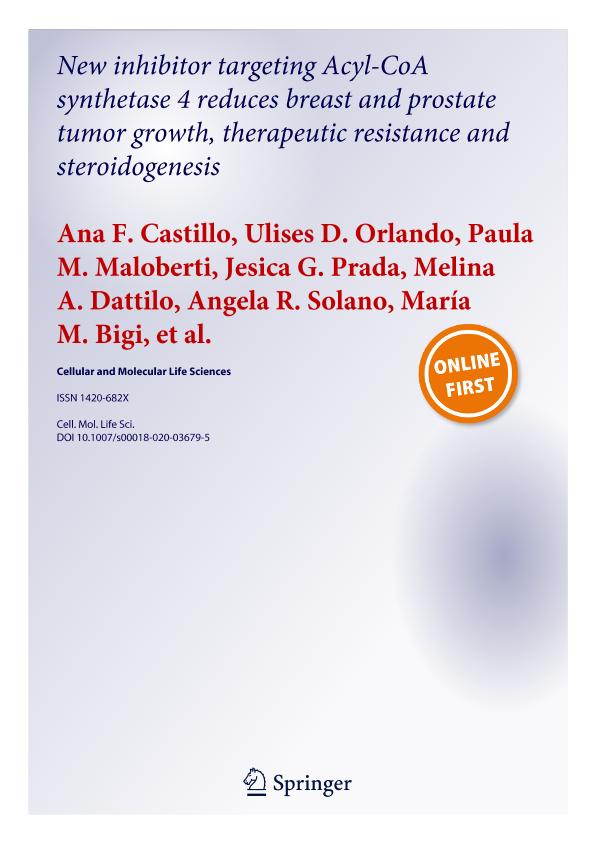Artículo
New inhibitor targeting Acyl-CoA synthetase 4 reduces breast and prostate tumor growth, therapeutic resistance and steroidogenesis
Castillo, Ana Fernanda ; Orlando, Ulises Daniel
; Orlando, Ulises Daniel ; Maloberti, Paula Mariana
; Maloberti, Paula Mariana ; Prada, Jesica Giselle
; Prada, Jesica Giselle ; Dattilo, Melina Andrea
; Dattilo, Melina Andrea ; Solano, Angela Rosario
; Solano, Angela Rosario ; Bigi, Maria de Las Mercedes
; Bigi, Maria de Las Mercedes ; Ríos Medrano, Mayra Agustina
; Ríos Medrano, Mayra Agustina ; Torres, María T.; Indo, Sebastián; Caroca, Graciela; Contreras, Hector R.; Marelli, Belkis Ester
; Torres, María T.; Indo, Sebastián; Caroca, Graciela; Contreras, Hector R.; Marelli, Belkis Ester ; Salinas, Facundo José
; Salinas, Facundo José ; Salvetti, Natalia Raquel
; Salvetti, Natalia Raquel ; Ortega, Hugo Hector
; Ortega, Hugo Hector ; Lorenzano Menna, Pablo
; Lorenzano Menna, Pablo ; Szajnman, Sergio Hernan
; Szajnman, Sergio Hernan ; Gómez, Daniel Eduardo; Rodriguez, Juan Bautista
; Gómez, Daniel Eduardo; Rodriguez, Juan Bautista ; Podesta, Ernesto Jorge
; Podesta, Ernesto Jorge
 ; Orlando, Ulises Daniel
; Orlando, Ulises Daniel ; Maloberti, Paula Mariana
; Maloberti, Paula Mariana ; Prada, Jesica Giselle
; Prada, Jesica Giselle ; Dattilo, Melina Andrea
; Dattilo, Melina Andrea ; Solano, Angela Rosario
; Solano, Angela Rosario ; Bigi, Maria de Las Mercedes
; Bigi, Maria de Las Mercedes ; Ríos Medrano, Mayra Agustina
; Ríos Medrano, Mayra Agustina ; Torres, María T.; Indo, Sebastián; Caroca, Graciela; Contreras, Hector R.; Marelli, Belkis Ester
; Torres, María T.; Indo, Sebastián; Caroca, Graciela; Contreras, Hector R.; Marelli, Belkis Ester ; Salinas, Facundo José
; Salinas, Facundo José ; Salvetti, Natalia Raquel
; Salvetti, Natalia Raquel ; Ortega, Hugo Hector
; Ortega, Hugo Hector ; Lorenzano Menna, Pablo
; Lorenzano Menna, Pablo ; Szajnman, Sergio Hernan
; Szajnman, Sergio Hernan ; Gómez, Daniel Eduardo; Rodriguez, Juan Bautista
; Gómez, Daniel Eduardo; Rodriguez, Juan Bautista ; Podesta, Ernesto Jorge
; Podesta, Ernesto Jorge
Fecha de publicación:
17/10/2020
Editorial:
Springer
Revista:
Cellular and Molecular Life Sciences
ISSN:
1420-682X
e-ISSN:
1420-9071
Idioma:
Inglés
Tipo de recurso:
Artículo publicado
Clasificación temática:
Resumen
Acyl-CoA synthetase 4 (ACSL4) is an isoenzyme of the fatty acid ligase-coenzyme-A family taking part in arachidonic acid metabolism and steroidogenesis. ACSL4 is involved in the development of tumor aggressiveness in breast and prostate tumors through the regulation of various signal transduction pathways. Here, a bioinformatics analysis shows that the ACSL4 gene expression and proteomic signatures obtained using a cell model was also observed in tumor samples from breast and cancer patients. A well-validated ACSL4 inhibitor, however, has not been reported hindering the full exploration of this promising target and its therapeutic application on cancer and steroidogenesis inhibition. In this study, ACSL4 inhibitor PRGL493 was identified using a homology model for ACSL4 and docking based virtual screening. PRGL493 was then chemically characterized through nuclear magnetic resonance and mass spectroscopy. The inhibitory activity was demonstrated through the inhibition of arachidonic acid transformation into arachidonoyl-CoA using the recombinant enzyme and cellular models. The compound blocked cell proliferation and tumor growth in both breast and prostate cellular and animal models and sensitized tumor cells to chemotherapeutic and hormonal treatment. Moreover, PGRL493 inhibited de novo steroid synthesis in testis and adrenal cells, in a mouse model and in prostate tumor cells. This work provides proof of concept for the potential application of PGRL493 in clinical practice. Also, these findings may prove key to therapies aiming at the control of tumor growth and drug resistance in tumors which express ACSL4 and depend on steroid synthesis.
Archivos asociados
Licencia
Identificadores
Colecciones
Articulos(ICIVET-LITORAL)
Articulos de INST. DE CIENCIAS VETERINARIAS DEL LITORAL
Articulos de INST. DE CIENCIAS VETERINARIAS DEL LITORAL
Articulos(INBIOMED)
Articulos de INSTITUTO DE INVESTIGACIONES BIOMEDICAS
Articulos de INSTITUTO DE INVESTIGACIONES BIOMEDICAS
Articulos(UMYMFOR)
Articulos de UNID.MICROANAL.Y MET.FISICOS EN QUIM.ORG.(I)
Articulos de UNID.MICROANAL.Y MET.FISICOS EN QUIM.ORG.(I)
Citación
Castillo, Ana Fernanda; Orlando, Ulises Daniel; Maloberti, Paula Mariana; Prada, Jesica Giselle; Dattilo, Melina Andrea; et al.; New inhibitor targeting Acyl-CoA synthetase 4 reduces breast and prostate tumor growth, therapeutic resistance and steroidogenesis; Springer; Cellular and Molecular Life Sciences; 78; 6; 17-10-2020; 2893-2910
Compartir
Altmétricas



